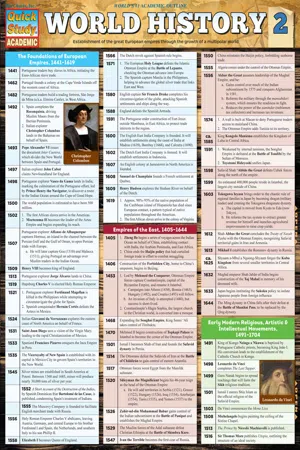
- 44 pages
- English
- ePUB (mobile friendly)
- Available on iOS & Android
eBook - ePub
About this book
The perfect study tool for students in a World History course or for any history buff's collection. This 6 page laminated guide is a timeline covering the utmost critical points, events, figures, cultural migrations, and destruction that led to the formation of the world of today. Part 2 of a series, this guide covers the foundations of European empires through the modern multi-polar world.
6 page laminated guide covers:
- The Foundations of European Empires, 1441-1609
- Empires of the East, 1405-1644
- Early Modern Religious, Artistic, and Intellectual Movements, 1491-1705
- The Scientific Revolution, 1543-1687
- State Building in the West, 1640-1763
- Eastern Empires Confront Modernity, 1682s-1876
- An Age of Revolutions, 1763-1865
- Colonizers and Colonized, 1858-1912
- The Birth of Modern Culture, Science, and Technology, 1776-1937
- The World at War, 1914-1945
- The Cold War and Decolonization, 1946-1989
- A Multipolar World, 1990-2013
Tools to learn more effectively

Saving Books

Keyword Search

Annotating Text

Listen to it instead
Information

An Age of Revolutions, 1765–1865
| 1765 |
|
| 1768 | British naval officer James Cook sets sail to explore the Pacific Ocean. |
| 1769 |
|
| 1772 | In the Somersett decision, British justice Lord Mansfield rules that slavery is unsupported by existing law in Britain. |
| 1774 | Louis XVI is crowned king of France. |
| 1775 | The American Revolution begins. |
| 1776 | The Declaration of Independence is adopted in the United States. |
| 1778 | France joins the U.S. war against Britain by entering into an alliance with the United States.
|
| 1783 | The Treaty of Paris ends the American Revolution with U.S. independence secured. |
| 1785 | British inventor Edmund Cartwright builds the first power loom. |
| 1787 | France’s Assembly of Notables gathers to discuss ways to address the nation’s debt crisis. They reject any plan to raise taxes on the nobility. |
| 1788 | Britain begins settling Australia. |
| 1789 |
|
| 1790 | France bans aristocratic titles, dissolves most religious orders, and requires that church officials be appointed by the Constituent Assembly. |
| 1791 |
|
| 1792 | France declares war on Austria. War with Prussia and Britain will soon follow, beginning the Wars of the French Revolution. |
| 1793 |
|
| 1794 | In the Thermidorian Reaction in France, Robespierre is toppled from power. The Reign of Terror ends and the Directory government is formed. |
| 1798 |
|
| 1799 | Napoleon overthrows the Directory government in France. |
| 1801 | L’Ouverture promulgates a constitution.
|
| 1802 |
|
| 1804 |
|
| 1805 |
|
| 1807 |
|
| 1808 |
|
| 1809 | A colonial junta is formed in Spanish Quito.
|
Table of contents
- The Foundations of European Empires, 1441–1619
- Empires of the East, 1405–1644
- Early Modern Religious, Artistic & Intellectual Movements, 1491–1704
- The Scientific Revolution, 1543–1687
- State Building in the West, 1640–1763
- Eastern Empires Confront Modernity, 1682–1876
- An Age of Revolutions, 1765–1865
- Colonizers & Colonized, 1858–1912
- The Birth of Modern Culture, Science & Technology, 1776–1937
- The World at War, 1914–1945
- The Cold War & Decolonization, 1946–1989
- A Multipolar World, 1990–2013
Frequently asked questions
Yes, you can cancel anytime from the Subscription tab in your account settings on the Perlego website. Your subscription will stay active until the end of your current billing period. Learn how to cancel your subscription
No, books cannot be downloaded as external files, such as PDFs, for use outside of Perlego. However, you can download books within the Perlego app for offline reading on mobile or tablet. Learn how to download books offline
Perlego offers two plans: Essential and Complete
- Essential is ideal for learners and professionals who enjoy exploring a wide range of subjects. Access the Essential Library with 800,000+ trusted titles and best-sellers across business, personal growth, and the humanities. Includes unlimited reading time and Standard Read Aloud voice.
- Complete: Perfect for advanced learners and researchers needing full, unrestricted access. Unlock 1.4M+ books across hundreds of subjects, including academic and specialized titles. The Complete Plan also includes advanced features like Premium Read Aloud and Research Assistant.
We are an online textbook subscription service, where you can get access to an entire online library for less than the price of a single book per month. With over 1 million books across 990+ topics, we’ve got you covered! Learn about our mission
Look out for the read-aloud symbol on your next book to see if you can listen to it. The read-aloud tool reads text aloud for you, highlighting the text as it is being read. You can pause it, speed it up and slow it down. Learn more about Read Aloud
Yes! You can use the Perlego app on both iOS and Android devices to read anytime, anywhere — even offline. Perfect for commutes or when you’re on the go.
Please note we cannot support devices running on iOS 13 and Android 7 or earlier. Learn more about using the app
Please note we cannot support devices running on iOS 13 and Android 7 or earlier. Learn more about using the app
Yes, you can access World History 2 by David Head in PDF and/or ePUB format, as well as other popular books in History & World History. We have over one million books available in our catalogue for you to explore.